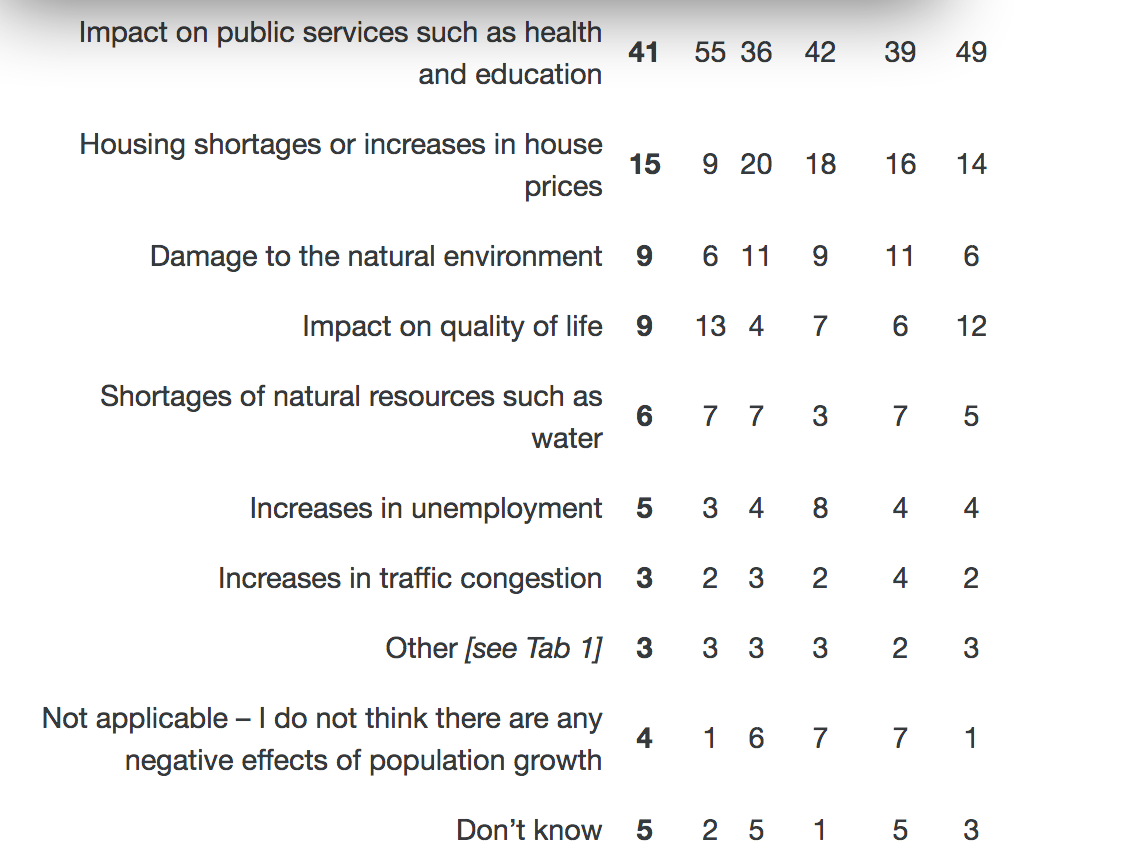
Three-quarters want population policy in UK (poll)
Placeholder lead
PRESS RELEASE
10 July 2018 Immediate use
Three-quarters want population policy in UK
According to a YouGov poll, 74% of UK adults believe the government should have a national strategy for addressing population, while 64% think the rate of population growth projected by the Office for National Statistics is too high [1]. The poll is being released as the National Infrastructure Commission releases its report making recommendations for future energy, transport and housing, among other issues [2].
Conducted following the announcement that the UK population has topped 66 million, the poll, commissioned by campaigning charity Population Matters, also found that 63% of people supported the government setting targets for population, with 50% overall believing that the current UK population is too high. Population Matters has called for the establishment of a Sustainable Population Policy in the UK [3].
Other results of the poll, commissioned by campaigning charity Population Matters, include:
- 41% believe the greatest negative effect of population growth is its impact on public services.
- Only 2% think our current population is too low.
- The poll revealed a significant gap between ‘Leave’ and ‘Remain’ voters on population – 84% of Leave voters believe projected growth is too high, whilst just 49% of Remain voters share that view. However, only 1% in both groups believe that the projected population growth is too low.
- Despite variations in level of concern between those who voted Conservative, Labour or Liberal Democrat in the 2017 election, and between Leave and Remain voters, in none of these categories is there a majority who believe population to be currently about right or too low, or projected population growth to be about right or too low.
The poll was conducted using the population figure of 66m released by the Office for National Statistics (ONS) on 28 June [4]. Respondents were informed that the UK’s population in 2041 is projected to be 72.9m (the most recent ONS projection, made in October 2017 [5]).
Asked whether this future population growth was ‘too high’, ‘too low’ or ‘about right’, results by vote in the 2017 election and EU referendum broke down as follows (by percentage):

Population Matters is calling on all political parties to support the implementation of a Sustainable Population Policy for the UK. Its recommendations include setting targets for population and making population and demography the responsibility of a Cabinet Minister [2].
Population Matters director Robin Maynard said:
“The message of this poll couldn’t be clearer: people want politicians to address the overall issue of population and its impacts. Across all the main political parties, including across the polarised positions on Brexit, those who want action or are concerned about our present and projected population numbers, outnumber those who are satisfied or think population is too low.
“Whilst plenty of polls have told us about people’s views on immigration, this is the first recent poll to look beyond that narrow framing and focus on the numbers, as provided by the best available analysis. As such, it tells policy-makers that the public have broader, legitimate concerns about population pressure itself that cannot be dismissed as based merely on ideology, party affiliation, polarised positions on Brexit, or simply ignorance.”
The four biggest negative effect of population growth in the UK identified by the respondents were:
- impact on public services such as health and education (41%)
- housing shortages or increase in house prices (15%)
- impact on the natural environment (9%)
- impact on quality of life (9%)
Robin Maynard added:
“The Infrastructure Commission has set some ambitious and welcome goals but meeting all of them will be made more challenging by an increasing population. People across the board are looking for intelligent, forward-planning and positive action on population from government – a strategy for the immediate and long-term to achieve a population in balance with the available resources and infrastructure of our country, and wider, shared global ecosystems. That’s what Population Matters is calling for, a Sustainable Population Policy underpinned by best available evidence and recognising wider planetary responsibilities and human rights.’
-ends-
Contact:
Alistair Currie, Head of Campaigns and Communications
E: Alistair.currie@populationmatters.org
T: +44 (0)208 123 9170
Notes for editors
[1] All figures, unless otherwise stated, are from YouGov Plc. Total sample size was 1,693 adults. Fieldwork was undertaken between 28th – 29th June 2018. The survey was carried out online. The figures have been weighted and are representative of all GB adults (aged 18+).
Questions:
Generally speaking, do you think the government should, or should not, have a strategy to address population in the UK?

Would you support or oppose the government setting a target for the population level in the UK?

The UK’s population is currently 66 million. Generally speaking, do you think this is too high, too low, or about right?

Based on current rates of growth, the Office for National Statistics projects that in 2041 the population will increase from 66 million now to 72.9 million. Generally speaking, do you think this rate of population growth is too high, too low or about right?

Which, if any, of the following do you think is the biggest negative effect of population growth in the UK?

[2] National Infrastructure Commission National infrastructure Assessment, 10 July 2018
[3] Population Matters, Sustainable Population Policy
[5] Office for National Statistics, National population projections, 2016 based, 26 October 2017
